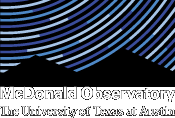Einstein’s Biggest Blunder?
8 October 2003
Public Lecture Accompanies Symposium Honoring Dr. Frank Bash
Austin, Texas — Dr. Alex Filippenko, professor of astronomy at The University of California, Berkeley, will discuss evidence that the universe’s expansion is speeding up, rather than slowing down as expected at a free lecture at The University of Texas at Austin next Friday.
The event will be Friday, October 17, at 7 p.m. in room 2.224 of Welch Hall on the Austin campus. (Maps of the campus can be obtained here).
Background
The UT Department of Astronomy and the American Astronomical Society (AAS) are sponsoring this AAS Second Century Scholar Lecture, which accompanies a symposium honoring Dr. Frank Bash. Dr. Bash stepped down as director of McDonald Observatory on September 30 after 14 years in the position.
Five years ago, observations of very distant exploding stars provided intriguing evidence that the expansion of the universe is speeding up with time, rather than slowing down as expected. New, completely independent data greatly support this conclusion, which resurrects the idea of a long-range "antigravity" effect first proposed by Albert Einstein. He later renounced the idea as his "biggest blunder." The discovery of the so-called accelerating universe was voted the top "Science Breakthrough of 1998" by Science magazine, and was the cover story for a June 2001 issue of TIME magazine.
The lecturer, Dr. Alex Filippenko, received his doctorate in astronomy from Caltech in 1984 and joined The University of California, Berkeley, faculty in 1986. His primary areas of research are exploding stars, active galaxies, black holes, and the expansion of the universe. He has co-authored more than 400 publications on these topics, and has won numerous awards for his teaching and research. He has served as President of the Astronomical Society of the Pacific and Councilor of the American Astronomical Society.
— END —





